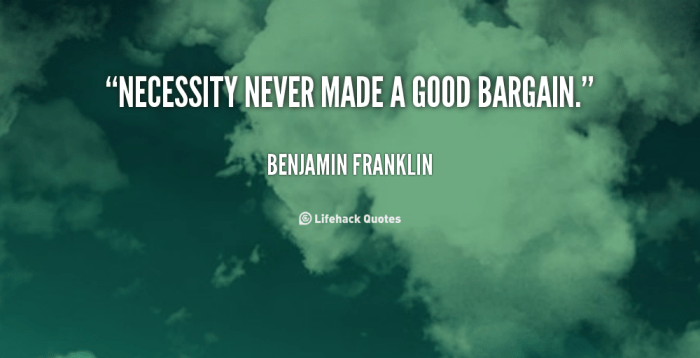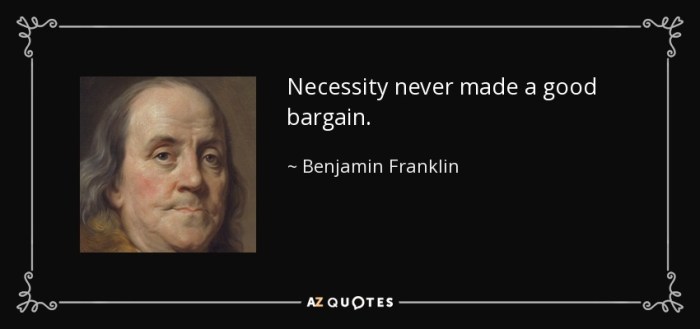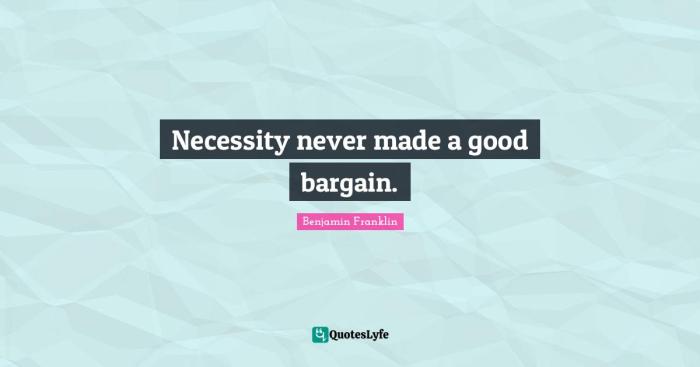Necessity never made a good bargain meaning – Necessity never made a good bargain is a proverb that cautions against making decisions under pressure. When we are desperate, we are more likely to make poor choices that we may later regret. This is because necessity weakens our bargaining power and can lead to impulsive decisions.
In this article, we will explore the meaning of this proverb and discuss the dangers of making decisions under pressure. We will also provide some tips for strengthening your bargaining position and making informed decisions, even when faced with urgent demands.
Understanding the Proverb
The proverb “Necessity never made a good bargain” succinctly conveys the idea that decisions made under duress or desperation often lead to unfavorable outcomes.
Figuratively, the proverb suggests that when an individual is compelled by urgent need, they may be more inclined to compromise their principles or accept terms that are not in their best interests. In such situations, the pressure to fulfill an immediate requirement can cloud judgment and lead to hasty or unwise choices.
Examples of situations where this proverb applies include:
- A person facing eviction may accept a substandard apartment at an inflated rent.
- A company in financial distress may sell assets at a loss to cover payroll expenses.
- A student desperate to pass an exam may resort to plagiarism.
Necessity and Bargaining Power

When faced with necessity, an individual’s bargaining position can be significantly weakened. The urgency to meet an immediate need can create a sense of desperation, which can lead to poor decision-making.
In negotiations, necessity can compromise outcomes in the following ways:
- Reduced leverage:A person in need may be more willing to concede to the other party’s demands to avoid further hardship.
- Limited options:Necessity can limit an individual’s options, making them more susceptible to unfavorable terms.
- Emotional vulnerability:Desperation can evoke strong emotions, such as fear or anxiety, which can impair judgment and make it difficult to negotiate effectively.
Examples of negotiations where necessity compromised outcomes include:
- A tenant who is desperate for housing may agree to a higher rent than they can afford.
- A seller who needs to liquidate assets quickly may accept a lower price than they would otherwise.
- A company facing bankruptcy may be forced to accept unfavorable terms from creditors.
The Dangers of Impulsive Decisions

Making decisions under pressure can increase the risk of making impulsive choices. When faced with urgent demands, individuals may be more likely to act without carefully considering the consequences.
Emotions can cloud judgment in the following ways:
- Fear:The fear of missing out or not meeting a deadline can lead to hasty decisions.
- Anxiety:Anxiety about the consequences of not taking action can prompt individuals to make impulsive choices.
- Excitement:The excitement of a potential opportunity can cloud judgment and lead to poor decision-making.
Examples of impulsive purchases or agreements that led to regret include:
- Buying a car without thoroughly researching the model or financing options.
- Signing a contract without fully understanding the terms and conditions.
- Making a large investment without consulting a financial advisor.
Alternative Approaches to Bargaining

There are strategies that can be employed to strengthen one’s bargaining position and avoid the pitfalls of impulsive decision-making.
Preparation and research are crucial for successful negotiations:
- Gather information:Research the other party, their interests, and the market conditions.
- Identify your goals:Determine your minimum acceptable terms and your target outcome.
- Develop a negotiation strategy:Plan your approach, including your opening position and concessions.
Examples of successful negotiations where these strategies were employed include:
- A union that thoroughly researched the industry and prepared a detailed proposal was able to negotiate a favorable contract with management.
- A buyer who conducted extensive market research was able to secure a lower purchase price for a home.
- A salesperson who understood the customer’s needs and developed a tailored presentation was able to close a major deal.
Balancing Necessity and Reason

In certain situations, it may be necessary to prioritize immediate needs over long-term goals. However, it is important to make informed decisions that balance both aspects.
The following steps can help individuals make wise choices when faced with urgent demands:
- Assess the situation:Consider the urgency of the need and the potential consequences of not meeting it.
- Evaluate options:Explore alternative solutions that may not require compromising long-term goals.
- Seek advice:Consult with trusted individuals, such as family members, friends, or financial advisors, to gain different perspectives.
Examples of situations where prioritizing necessity led to positive outcomes include:
- A student who needs to work part-time to pay for tuition may delay graduation to avoid taking on excessive debt.
- A company that needs to lay off employees during an economic downturn may offer severance packages to minimize the impact on affected workers.
- A homeowner who needs to sell their house quickly may accept a lower offer to avoid foreclosure.
User Queries: Necessity Never Made A Good Bargain Meaning
What does the proverb “necessity never made a good bargain” mean?
This proverb means that when we are desperate, we are more likely to make poor choices that we may later regret. This is because necessity weakens our bargaining power and can lead to impulsive decisions.
What are some examples of situations where the proverb “necessity never made a good bargain” applies?
This proverb applies to any situation where we are under pressure to make a decision. For example, it may apply when we are buying a car, negotiating a salary, or making a financial decision.
What are some tips for strengthening our bargaining position and making informed decisions, even when faced with urgent demands?
There are a few things we can do to strengthen our bargaining position and make informed decisions, even when faced with urgent demands. First, we should take the time to research our options and understand the market. Second, we should be prepared to walk away from the negotiation if we are not satisfied with the terms.
Finally, we should trust our instincts and make the decision that we feel is best for us.